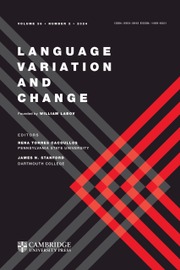Article contents
Variation as a feature of language acquisition in the Trinidad context
Published online by Cambridge University Press: 28 November 2008
Abstract
In a longitudinal acquisition study of the development of the verb phrase (VP), a Trinidadian child who was exposed to both Standard English (SE) and Trinidadian English-lexicon Creole (TC) was found to use the verb forms of each system differentially according to addressee, discourse mode, semantic intent, and grammatical factors. Systematic variation was first recorded at age 2;7 and continued to develop through to the end of the study at age 4;9. School exposure to demands for SE production resulted in a decline in the child's productive TC competence overall and his movement into mid-range usage of SE and TC. The systems in contact appeared linked for the child in that he produced alternant forms from each one variably in apparent relation to his perception of the appropriate extent and range of their use. The weightings for variable constraints in each area modified over time.
- Type
- Research Article
- Information
- Copyright
- Copyright © Cambridge University Press 1991
References
- 15
- Cited by


